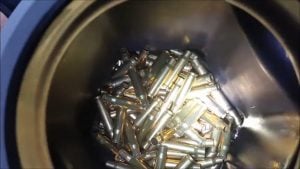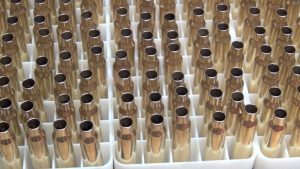Are you thinking about to reload your ammo? Trying to save some money by reloading? Can’t decide which metal to go for?
Then look no further. Because this article will answer your queries.

The two main options when it comes to casings are brass and nickel plated brass. Now both of these have their benefits and downside.
Here I will try to explain the pros and cons of both brass and nickel plated brass. So that you can take a good decision about which one you should go for.
One of the most used materials when it comes to ammo and reloading is brass and nickel. Nowadays nickel-plated brass is also in use in a great amount.
There is a definite reason for choosing brass and nickel-plated brass for reloading.
Brass is mainly an alloy of copper and zinc. It is one of the primary materials for making cartridge cases.
Despite tons of good sides, the brass casing has its disadvantage also.
New brass is exactly the name said, they are new and never been used. They only have imperfection from the manufacturing process.
On the other hand, the latter is once used or fired once from a gun. This one may not last as long as the new one.
But still, the decision also includes money and availability. So make your choice.
Judge the quality of the brass you are buying. Cause, not all samples will have the same quality as the testing one. So try to find a trustworthy and authorize distributor.
And make sure the weight and thickness of the brass casing are constant in the same lot. Otherwise, it will become difficult to maintain safety and proper order.
Almost all retailer offers a huge discount on purchasing in a great amount at a time. So don’t forget to push your luck a little further and get as much as the discount you can get. This will save you a lot of money on the go.
 Primed brass is easier to use in the first round as you can use it right after inserting. But you have to change the powder and temper to make everything goes right.
Primed brass is easier to use in the first round as you can use it right after inserting. But you have to change the powder and temper to make everything goes right.
But with the unprimed one, you don’t have to change anything. This one is cheaper as well.
So the decision is yours to make.
Now let’s discuss the nickel plated brass.
Nickel plated brass is still brass with a coating of nickel on the surface done by electroplating. The core is pure brass.
Nowadays many professional companies have started nickel plated brass in their manufacturing process. The reasons for choosing the nickel plated brass are quite a few.
Now that you know the pros and cons of brass vs nickel plated brass casings, it’s up to you to make the decision.
Since the main aim of reloading is to save money, you can go for brass if the other cons don’t bother you since brass offers lots of benefits at a low price. There are many other options to buy brass at a cheaper price: once fired, from your local range, from your local brass goblin, etc.
But if you decide to go for nickel plated brass, just remember that the coating is only nickel, the core is still brass in this case. The nickel plated ones are corrosion resistant and remain shiny for a longer time.
The main problem with the nickel plated one has to do with the reloading ease.
Don’t forget to always check your cartridges before reloading them.

Joseph Fox writes on a variety of topics ranging from reloading ammunition to gun cleaning. He has been featured on various publications like thetruthaboutguns, Sofrep & many more. Joseph is also the founder of Gunloading, where he reviews different types of reloading & firearm products available on the market.
Gunloading.com is a participant in the Amazon Associates Program, an affiliate advertising program designed to provide a means for us to earn fees by linking to Amazon.com and affiliated sites.
About Us | Contact Us | Privacy Policy | Amazon Affiliate Disclosure
Copyright © 2022 Gunloading.com All Rights Reserved